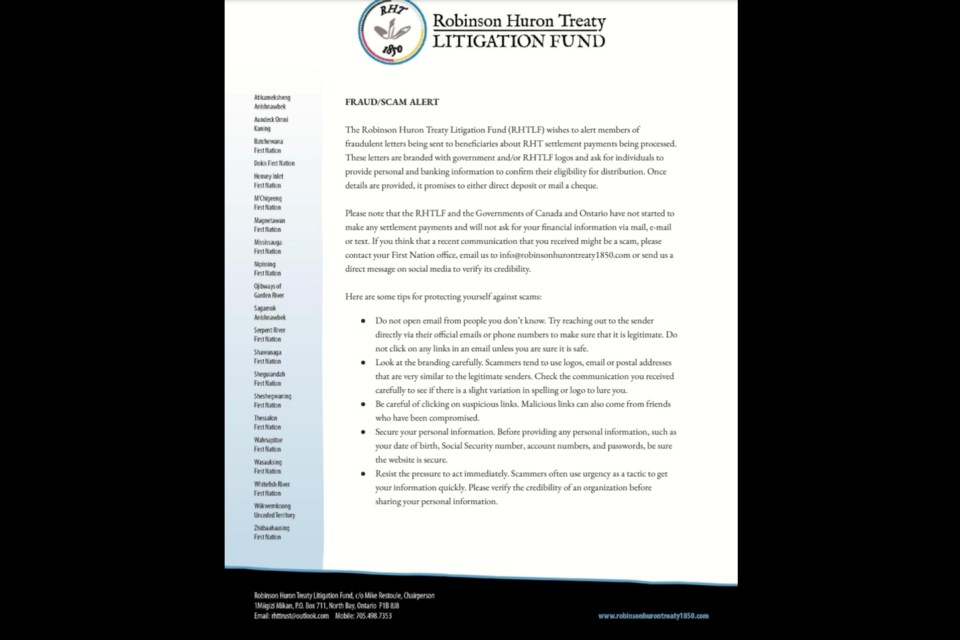Members of Robinson Huron Treaty (RHT) First Nations are becoming targets for scams asking for personal and banking information.
The Robinson Huron Treaty Litigation Fund (RHTLF) issued a warning late Tuesday, Nov. 21, warning members of fraudulent letters being sent to beneficiaries about RHT settlement payment processing.
“These letters are branded with government and/or RHTLF logos and ask for individuals to provide personal and banking information to confirm their eligibility for distribution,” reads the release from RHTLF. “Once details are provided, it promises to either direct deposit or mail a cheque.”
You can see an image of the letter sent to RHT members below.

On June 17, the Robinson Huron Treaty Litigation Fund (RHTLF) and the Governments of Canada and Ontario announced a proposed settlement of $10 billion for past compensation following negotiations in the Robinson Huron Treaty annuities case. Canada and Ontario have not yet signed the settlement officially.
In a recent release, the RHTLF announced a “goal timeline” of February 2024 to receive the $10 billion settlement amount from the governments of Canada and Ontario, and set spring/summer of 2024 as the target for communities to begin per capita distributions.
It then notes that the governments of Canada and Ontario have not begun to issue settlement cheques, and in addition, “will not ask for your financial information via mail, e-mail or text.”
The release asks members to contact RHTLF if they are concerned.
“If you think that a recent communication that you received might be a scam, please contact your First Nation office, email us to [email protected] or send us a direct message on social media to verify its credibility.
They also offer tips for members to protect against scams. They include:
- Do not open email from people you don’t know. Try reaching out to the sender directly via their official emails or phone numbers to make sure that it is legitimate. Do not click on any links in an email unless you are sure it is safe.
- Look at the branding carefully. Scammers tend to use logos, email or postal addresses that are very similar to the legitimate senders. Check the communication you received carefully to see if there is a slight variation in spelling or logo to lure you.
- Be careful of clicking on suspicious links. Malicious links can also come from friends who have been compromised.
- Secure your personal information. Before providing any personal information, such as your date of birth, Social Security number, account numbers, and passwords, be sure the website is secure.
- Resist the pressure to act immediately. Scammers often use urgency as a tactic to get your information quickly. Please verify the credibility of an organization before sharing your personal information.
Jenny Lamothe is a reporter with Sudbury.com. She covers the diverse communities of Sudbury, especially the vulnerable or marginalized, including the Black, Indigenous, newcomer and Francophone communities, as well as 2SLGBTQ+ and the downtown core.